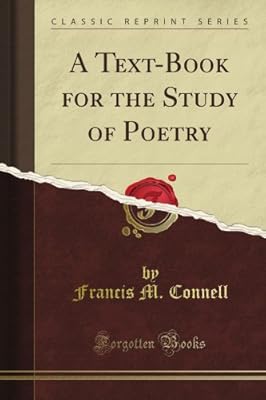A Text-Book for the Study of Poetry (Classic Reprint)
Price:
$12.35
Availability:
Not Available - stock arriving soon
Product Information (more info)
CERTAIN CONTENT THAT APPEARS ON THIS SITE COMES FROM AMAZON SERVICES LLC. THIS CONTENT IS PROVIDED 'AS IS' AND IS SUBJECT TO CHANGE OR REMOVAL AT ANY TIME.
Manufacturer Details
The purpose of this book is not to furnish instruction in the art of verse-making, but rather to set forth the fundamental principles of criticism by which to form some estimate of acknowledged poetry. It has been truly said that in order to judge a poem, it is first necessary to enjoy it. This susceptibility to poetry, so far as it is communicable at all, must come from contact with the living teacher, and neither this nor any other book is calculated to awaken it. But once awakened the taste may be educated, as it may be vitiated; it may be developed, controlled, directed into right channels; and this may be done efficaciously, by principles and precepts, provided that they are not learned as abstractions, but tested and realized in the students own reading. The low esteem in which poetry is often held in our day seems, at least in part, to proceed from a misconception of its office. It is regarded merely as a pastime for dilettanti, or a solace for the leisure hours of the sentimental, and this conception is fostered by such criticism as lays undue stress on mere form or style, as if the appeal of poetry resided in the fascination of musical verse or felicitous diction. But poetry surely contains more for us than the allurement of words. More than any other form of literature, it creates our ideals, enriches our emotions, ennobles our reflections.
(Typographical errors above are due to OCR software and don't occur in the book.)
About the Publisher
Forgotten Books is a publisher of historical writings, such as: Philosophy, Classics, Science, Religion, History, Folklore and Mythology.
Forgotten Books' Classic Reprint Series utilizes the latest technology to regenerate facsimiles of historically important writings. Careful attention has been made to accurately preserve the original format of each page whilst digitally enhancing the aged text.
(Typographical errors above are due to OCR software and don't occur in the book.)
About the Publisher
Forgotten Books is a publisher of historical writings, such as: Philosophy, Classics, Science, Religion, History, Folklore and Mythology.
Forgotten Books' Classic Reprint Series utilizes the latest technology to regenerate facsimiles of historically important writings. Careful attention has been made to accurately preserve the original format of each page whilst digitally enhancing the aged text.







